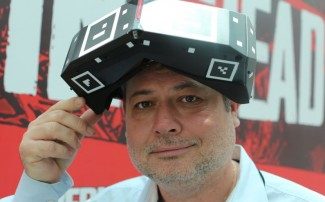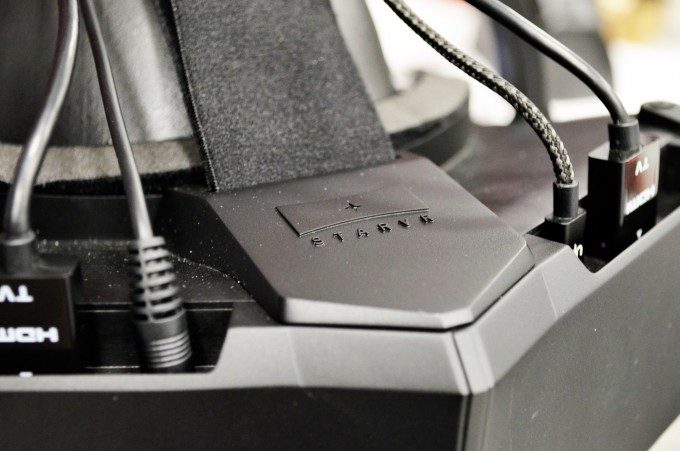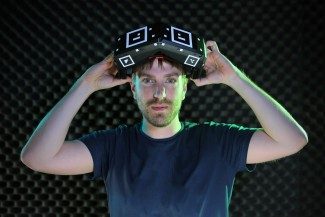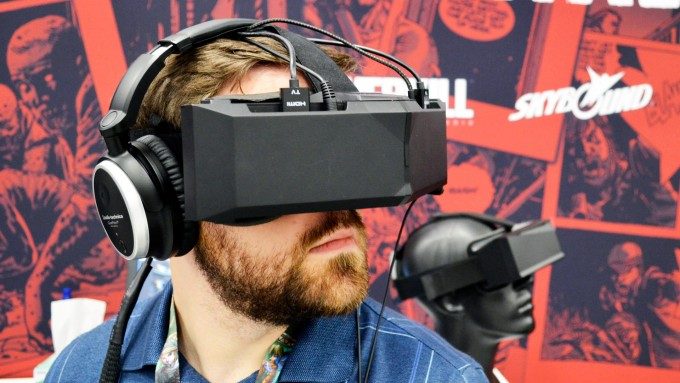At E3 2016 I got to sit down with the CTO of Starbreeze Studios, Emmanuel Marquez, to learn about the company’s ambitious plans for their StarVR headset. The headset, which sets itself apart from others with a massive 210 degree field of view, is designed for high-end virtual reality experiences in the out-of-home market.
After my hands-on with the latest StarVR ‘1.4’ prototype at E3 2016, I was impressed with the progress the company has made since the headset first debuted a year ago. But there’s still a number of improvements and additions to be made to the device before it’s ready to be deployed. In and interview at E3 2016, Starbreeze CTO Emmanuel Marquez outlined the company’s plans for the headset between now and then.

The StarVR prototype I tried at E3 2016 was tracked using Sixense STEM, but Marquez tells me that the company is working on its own roomscale tracking system for StarVR which is based on different tech than Oculus’ ‘Constellation’ or Valve’s ‘Lighthouse’ systems. He wouldn’t go into detail beyond saying that it’s an ‘outside-in’ tracking system, though he did mention that its range may exceed roomscale (which is roughly 12×12 feet).
Which of course leads to the question of what kind of input users will have when using the system. Marquez says the plan is to attach a tracker to different props as needed by individual experiences (like the shotgun used in the Walking Dead experience), but for more universal input, the company is building their own VR controller similar to Oculus Touch and the HTC Vive controllers.
While the StarVR 1.4 prototype has noticeably improved visuals compared to the prior version, the displays are still lacking low-persistence, a feature which greatly reduces blur during head movement. Marquez is aware of the importance of low-persistence and says it’s a priority.
“Obviously we’re working on low persistence, and we’ll have that ready pretty soon, we know we need to go there so there is no question,” he said.

Marquez also reaffirmed plans for integrated eye-tracking in StarVR to allow the headset to automatically detect and set IPD (hardware and software adjustment) and support foveated rendering. Foveated rendering is a technique by which only a small part of the scene corresponding to the user’s gaze is rendered in high fidelity while surrounding areas are rendered at lower resolutions. Done correctly, foveated rendering can go unnoticed by users while reducing the computing power required to render the scene. This is especially attractive for the StarVR headset because of its monstrous 5120×1440 resolution which requires significantly more power to fill than the 2160×1200 resolution of major consumer headsets.

Marquez also elaborated on the positioning of the StarVR headset, saying that “for the moment we play pretty firmly in the location-based and enterprise market,” adding that the company has no plans at this time to make StarVR into a consumer headset. Instead, Starbreeze has partnered with IMAX to create ‘IMAX VR Centers’ which will use the StarVR system as a platform for proprietary pay-per-use VR experiences.
He compared the model of the IMAX VR Centers to movie theaters, saying that customers would come to the centers and have a choice of different VR experiences. And while IMAX is known for film-based entertainment, Marquez says that content in the VR arcades will include gaming content, interactive content, interactive movies, and more. The first IMAX VR Center pilot location will open this year in Los Angeles, and Starbreeze plans to expand to six centers by year’s end, he said.








